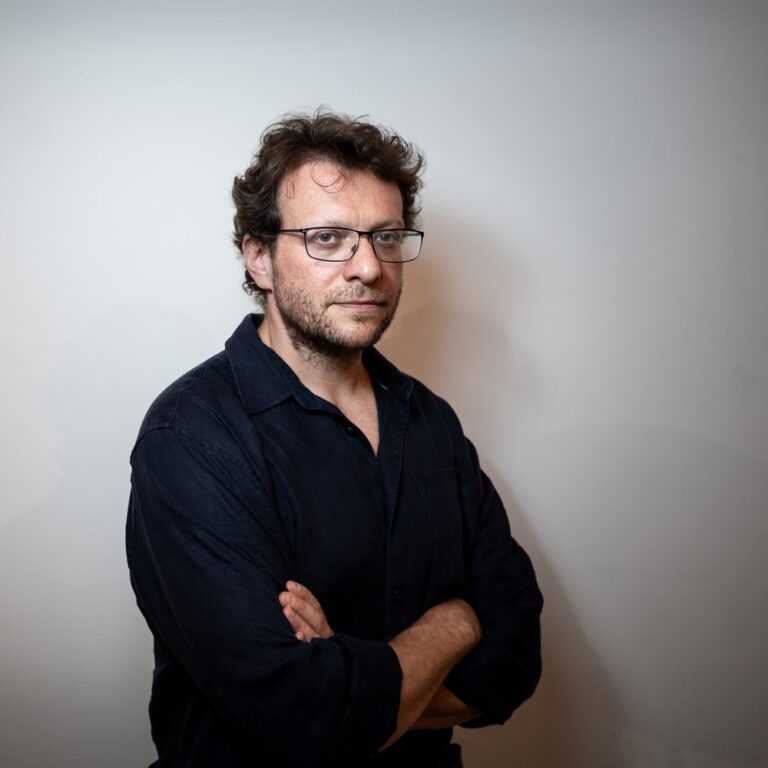While the impact of propaganda during wars and hybrid conflicts is rather difficult to measure, it has been an essential warfare tool for centuries. But what is propaganda, exactly? Can it be morally right? And what’s its role in the Russian war against Ukraine?
This episode of Ukraine Through the Eyes of Others features Peter Pomerantsev, a British academic, a Senior Fellow at Johns Hopkins University, and the author of two books about information in propaganda, Nothing is True and Everything is Possible and This is Not Propaganda. He explains the concept of propaganda and how it works in authoritarian versus democratic societies as well as evaluates Ukraine’s communication efforts.
— Peter, you were born in Kyiv. Could you please tell us more about your background?
— As I wrote in my second book, This is Not Propaganda, which combines memoir and propaganda storytelling, I was born here, and my parents are from here. The KGB arrested my father in 1977, the year I was born. Like many dissidents of that era, he was exiled from the former Soviet Union — my parents left the USSR when I was nine months old. After many adventures, they ended up in England, so I grew up there. I only knew about Kyiv as the place in my passport, and the first time I visited was when I was 18. Kyiv was sort of a mythical place for me growing up. My mother was especially obsessed with finding some place in Western Europe that looked like it. She always said, “I want to live somewhere that looks like Kyiv.” And she found places like that in different cities. It was a bit of a revelation when I came here and realised, “Oh, that’s what my mother was talking about.”
— And how did your identity of being from [Kyiv] shape your academic and writer’s career?
— I write about propaganda, but I don’t approach it like a political scientist or a media and communications expert. My interest lies in propaganda and its connection to identity. The essence of powerful propaganda, often malign, is in shaping models of identity that are harmful — and rescuing people from the uncertainty about their identity. I didn’t know that this happens all the time. Growing up as an émigré, I constantly moved between countries and cultures. Living in six or seven different cities by the time I was a teenager made me very aware of how various cultures moulded and changed identities through propaganda. It made me deeply interested in the idea that people are under the influence of what some academics call “sociological propaganda”: movies, culture, language, and stereotypes. It led me to wonder about freedom: “When are you yourself, and when are you under the influence of others?” I saw it in myself — every time I moved to a country, I would change. Every time I learned a language, I would change. Every time I moved cities, I would change. And that made me think, who am I then?
Then there was the problematic case of Russian propaganda and its influence on Ukraine, which has been ongoing for centuries but has become very active since 2004. As someone thinking about propaganda and how it gets weaponised, I started looking at the case of Russian influence in Ukraine relatively early. My interest in propaganda is part of my sort of international life. I do a lot of work in America now, in Germany, in Sweden, so I haven’t been purely fixated on Ukraine.
— Propaganda is quite a loaded term. Could you define it?
— In my last book, This is Not Propaganda, I specifically avoid using the word except in the title. This is because it’s so loaded, and everyone has their interpretation; furthermore, academics can’t agree on what it means. In the new book that I’ve just finished, I explore the term extensively. It’s sort of unavoidable. The book is a history book about the Second World War, and all the characters use it all the time.
Some people will say it’s simply any type of mass persuasion done in the interests of those doing the persuading. Others would say there’s no morality to it — if the message or the cause is moral, then it’s moral; if the cause is immoral, then it’s immoral. But there’s no a priori morality in it.
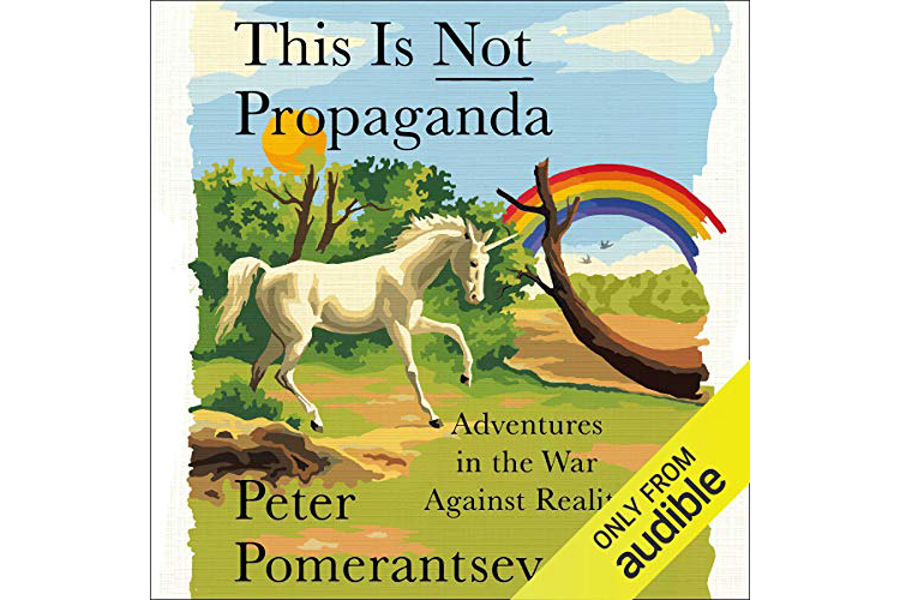
Peter Pomerantsev’s book on propaganda.
Many others would argue that it always involves some sort of manipulation of other people, where the audience doesn’t quite understand what’s happening. In that sense, there’s an inequality in the relationship, and therefore, it’s somehow deceptive — which is how it’s usually used. A classic case where it is used in America is around the topic of the environment. There was a famous bill by the Republican Party called the Clean Air Bill, which would actually allow for more pollution. That’s a classic example. You say one thing but mean another.
A more profound way of looking at propaganda is how the philosopher Jacques Ellul uses it. He’s probably the most exciting philosopher on this question. He talks about different layers of political propaganda, which include campaigns, PR, and the superficial things that we often discuss as positive or negative. Then he discusses sociological propaganda, which consists of more profound myths and stories that we need to survive as a society.
If we’re talking about America, concepts like the American dream and the American way of life are significant ideas without which a modern technological society can’t survive. He argues that when we move from little rural societies to prominent urban societies where people don’t know each other, people become united by technology and mass media. To survive as a community, propaganda is that thing which unites us. Any nation is defined by its propaganda.
Ellul still says that it can be very negative because his idea is that these myths become subconscious, and we stop analysing them. Going back to something like the American dream, there’s nothing wrong with it as long as it’s an idea you can criticise and engage with. He senses that sociological propaganda often becomes a myth. Because people are just living in it and not analysing it, they become very possessive of it, aggressive to anyone they fear is threatening it, and cling to it. This leads to a very undemocratic attitude. That would mean that anybody not following the American way of life becomes an enemy.
According to Ellul, propaganda is inevitable. It serves as the means through which we come together as a community in this age of technology. This perspective offers a deeper understanding of propaganda. The discussion becomes increasingly intriguing when shifting focus from the supply side (involving the creation of bots, trolls, and messages) to the demand side. On the demand side, we explore questions like why people seek disinformation and persuasion, how they respond to it, and what drives their need for a more profound sense of community and worldview.
— Does this imply that people require propaganda for their social lives?
— Even at the most basic level of political propaganda, the kind people typically focus on — the campaigns we all observe, analyse, and react to — the success of any propagandist, PR person, or political campaigner lies in understanding their audience and tailoring their message to fit that audience. Success is determined by how well one comprehends and connects with the audience. The more adept you are at this, the more successful you become; conversely, the less skilled you are, the less successful you become. This is the central question propagandists ask themselves each morning: How can I understand the audience better than my rival, and how can I reach them more effectively? It involves continuous audience analysis.
In its traditional sense, journalism consistently loses to any form of campaign — be it advertising, positive or negative messaging, disinformation, or information — because journalism often lacks the deep audience understanding characteristic of effective campaigns. As long as we continue in this manner, we will continue to lose. Numerous media outlets engage in propaganda; for example, in America, Fox News is solely focused on understanding its audience and providing them with the information or disinformation they desire. There was a recent case in America where Fox News knowingly propagated lies, claiming that the last election was stolen. Internal emails revealed, “We know this is a lie, but it’s what our audience wants. We have to give it to them.” However, Fox News doesn’t qualify as media in the philosophical sense of the term. They think like propagandists and faced consequences when their media organisation officially had to pay a $780 million fine. Thus, all of this becomes a race to better understand people, including their needs, desires, fears, and resentments — and that encapsulates the entire game.
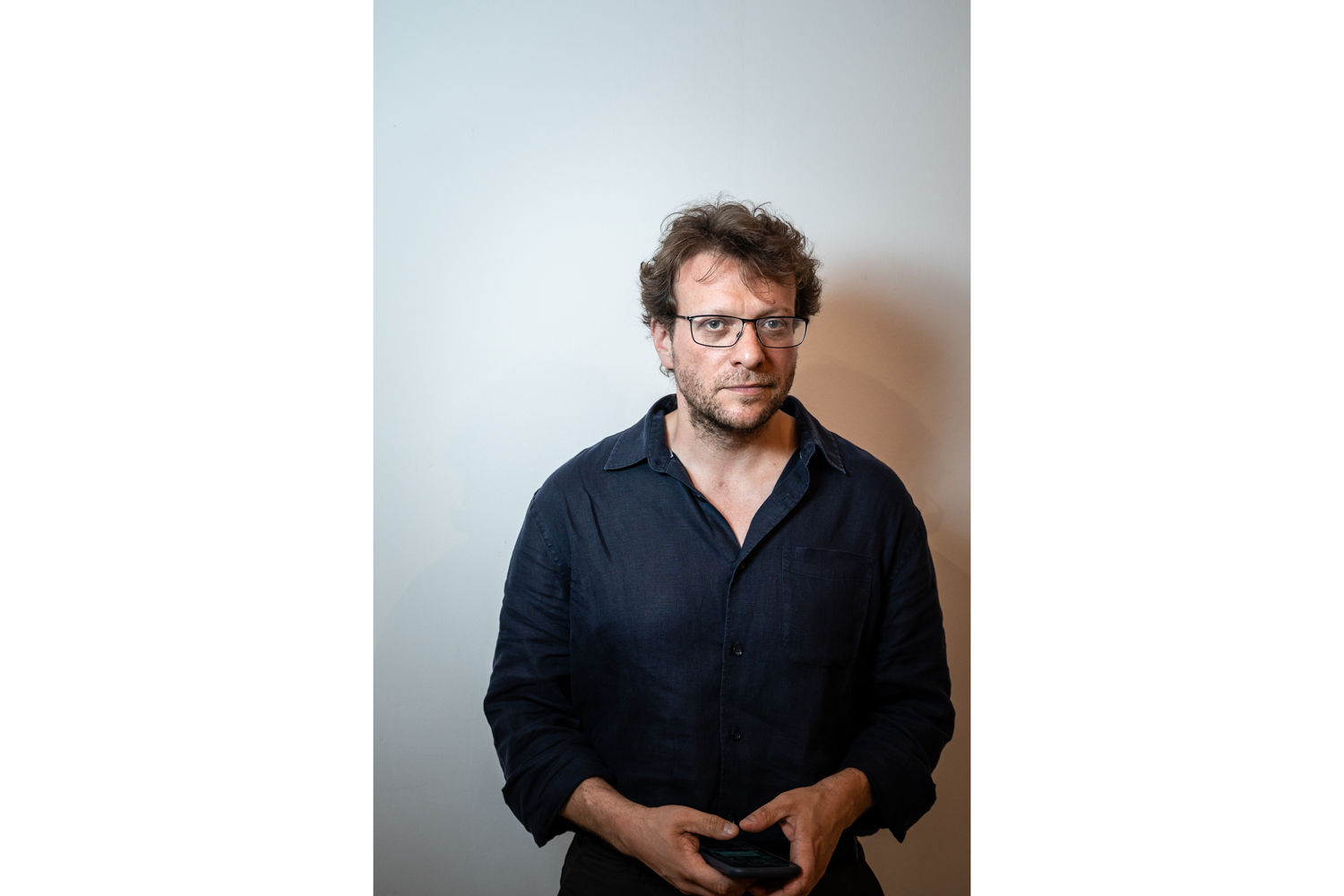
Peter Pomerantsev photographed by Artem Galkin for Ukraïner.
— How does Russian propaganda function for both the Russian audience within the country and internationally?
— In the Soviet tradition and in the Russian tradition, which is an inheritor of it, propaganda is taken very seriously. It is led from the highest levels of political power, and while there are many acts involved, it is centrally coordinated and centrally managed, and it is taken very, very seriously. From Lenin onwards, the propagandists have been privileged in the political system. They have this exalted role that they don’t have in Western governments. A small department in the State Department thinks about global engagement with a minimal budget and very little power.
The Russians take it seriously, and it goes right to the top. The Presidential Administration controls it. There’s a little division of powers between internal and external, between television and digital, like everything in the Russian system. It sets up competing powers. So it’s pretty flexible, but it’s centrally coordinated. And it is taken very seriously. The Chinese have the same system, as well. These regimes take propaganda very seriously, which is central to controlling their societies and manipulating others.
Secondly, there’s no shame around the word “propaganda”. Propaganda is seen as part of what you do, an essential part of governance. There is no way the concept of democracy is considered the public sphere. In this place, people are meant to debate with each other and exchange opinions, whereas the media plays a vital role in the sort of rough and tumble of democracy. There’s no belief in this. The media is either accused of being inefficient, but usually, it’s just accused of being corrupt. So the BBC, the government, and the media are all just tools of various secrets, cabals of powerful elites. The idea of the media existing as an independent force is dismissed. In this narrative, dictatorships are considered more honest, rejecting the idea of a public sphere as either inefficient or a façade masking the control of vested interests.
This viewpoint argues for centralised control and the necessity of propaganda, contrasting it with what they perceive as the chaos of democracies. They often point to examples like the United States or Ukraine, asserting that such countries epitomise disorder and inefficiency, reinforcing the need for centralised control and propaganda in the 21st century.
— What is the responsibility of technological giants and actors in addressing troll farms, and how can we effectively counteract their existence?
— We usually associate troll farms with what the tech companies now call “coordinated inauthentic behaviour”. The concern isn’t merely the existence of one or two deceptive messages but the mass creation of misleading online accounts. While most platforms claim to have policies combating and halting such activities, the key issue lies in enforcement and the consequences for those involved.
The challenge arises in determining effective punishment. If a troll farm is identified, and an account is shut down, the current perspective is that little is achieved, as the perpetrators can easily open a multitude of new accounts. Tech companies assert that they regulate this field, but the self-policing nature of their actions raises questions, given the lack of transparency in their methods. Initially, there was a reactive and naive response to capture every bit of disinformation, but this approach proved impractical. Disinformation itself is not a legal term, leading to a shift in focus from individual lies to addressing the systemic issue of numerous fake accounts disseminating deceptive information.
Participating in the parliamentary committee on disinformation in Britain, I realised that the term “disinformation” lacks legal standing. The core problem is not isolated lies but the presence of thousands or even hundreds of thousands of fake accounts amplifying them. Consequently, the approach shifted to targeting the system rather than individual pieces of information or disinformation, recognising the unique challenges posed by the internet. The internet’s novelty lies not in the speech itself but in the way information is distributed, prompting the need for new laws to address these distribution methods.
Despite progress in understanding these issues, challenges remain in terms of enforcement, identifying responsible parties, and determining appropriate punishments. For instance, if a PR company in Britain engages in fake campaigns, there is a consensus that without real consequences, such practices are likely to persist.
— When it comes to people deeply affected by propaganda and disinformation, should we even try to engage with them? In your opinion, is there a way to persuade them?
— Are we sure that these people are one homogeneous mass? One risks doing the propaganda’s work for them saying they are one people. The first thing you do is try to analyse them. For example, we did a lot of work in DNR (DNR or DPR, unrecognised Donetsk People’s Republic — ed.) on COVID-19. We took a few focus groups inside DNR, and also Russian-speaking groups in Estonia, trying to look at the COVID-19 question and how people feel about vaccines.
We saw that people who are vaccine sceptics believed in other crazy conspiracy theories. So this could be people with just deep, profound emotional issues. A lot had terrible experiences with medical professionals in the US. In Ukraine, in the occupied territories, and Estonia, they didn’t trust the medical profession because they’d had horrible experiences with this profession in Soviet times. A lot of them had memories of Chornobyl. They were entirely traumatised by Chornobyl. We should never call them “these people”. The moment you have done that, you have lost. That means you’ve already given the audience to the other side. Your job is to start analysing the audience, and understand it.
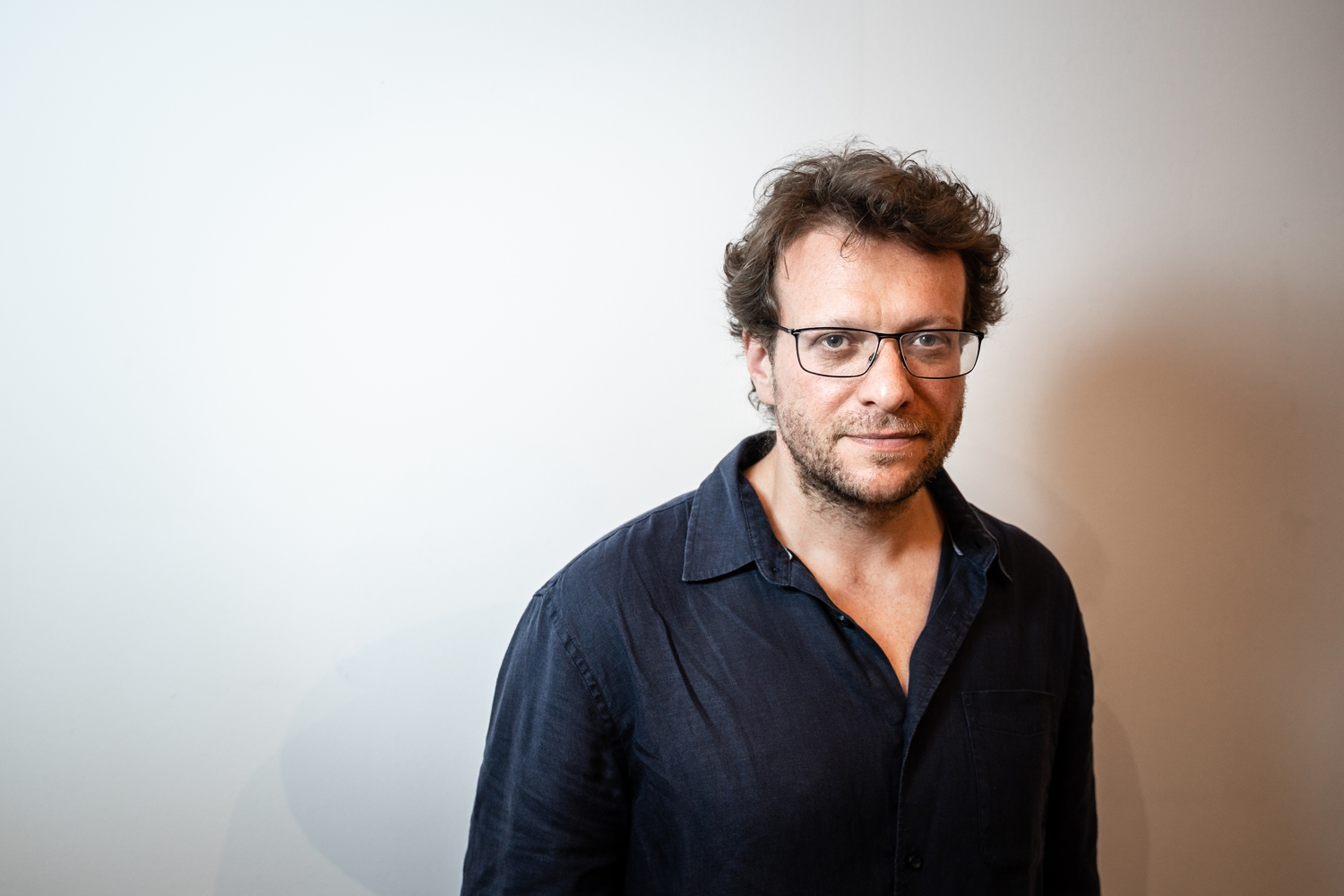
Peter Pomerantsev photographed by Artem Galkin for Ukraïner.
The second thing you said is “persuade”. Persuade to what end? What is our aim here? Is our aim to get them to use other sources of media? Is our aim to stop them from voting for fascist parties? Is our aim to make them not fight? What I would get rid of is a desire to search for some sort of morality tale: are they good or bad? That’s largely irrelevant, especially in the context of a war. You must move away from caring whether these people are good or bad. It’s an accurate fake search that’s completely irrelevant. What we have to do is win. And so winning will be who understands these audiences better, and winning is understanding what you want them to do. So those are the questions we need to be asking.
— How do you evaluate Ukraine’s efforts on the informational front?
— Ukraine has completely rewritten the rulebook, emerging as a model for other democracies. They have demonstrated that democracies can conduct effective public information campaigns, steering away from the term “propaganda”. Ukraine has excelled in international general information campaigns, showcasing a successful approach. Over the past 30 years in the West, there has been a loss of confidence in executing something known as public diplomacy. The ability of Western leaders to communicate with global populations, a practice prevalent during the Cold War and Second World War, has dwindled. The experience surrounding the War on Terror in the last three decades created a negative perception of public information efforts. However, Zelenskyy and his team have shattered these preconceptions, proving that a democratic leader can engage with nations worldwide, reaching unprecedented levels of popularity. Zelenskyy is now considered one of the most admired politicians in numerous democracies.
Living in Washington, I often inquire with people in power about the reluctance to undertake more public information campaigns to counter Russian influence. The response is often dismissive, citing that such tactics are characteristic of dictatorships, not democracies. However, historically, democracies have engaged in similar efforts. Zelenskyy’s approach has effectively rewritten the rulebook, providing a positive example of democratic communication in the 21st century. Maintaining this momentum will become increasingly challenging as the war persists. It is crucial not to rely solely on Zelenskyy, as people require a diverse array of characters, and numerous stories need to be told. Additionally, reaching audiences beyond democracies poses challenges, as some countries may not care or may align with Russia’s actions, viewing Putin as an influential figure to emulate in invading neighbouring nations.
— Is there any hope of conveying a positive message about Ukraine to the global South as well as non-democratic countries?
— Discussions in European capitals and Washington D.C. are now centering around an idea termed “information Ramstein”, a concept I proposed after conducting extensive research at the onset of the war. The focus is on how allies can collaborate to address complex communication challenges, particularly in reaching audiences in the global South and non-democratic nations. The key lies in allies coming together and strategizing on mutual assistance.
Ukraine excels in directly communicating in certain regions and can initiate a new narrative in places like Taiwan and Japan, where there is a perceived parallel between China and Russia. These countries may find resonance in Ukraine’s experiences, especially concerning its impressive digital technology. Collaborating with allies becomes essential in this endeavour. Some allies may have influence in specific countries, while others, like Ireland, may have strong relationships with Latin American nations. Leveraging information, often intertwined with financial influence related to trade and investment, requires a coordinated approach to surpass the sum of individual efforts. Recognising that America may be a valuable or challenging partner in different contexts is crucial. Prioritisation becomes essential when targeting the Global South, a term, though commonly used, oversimplifies the diverse dynamics of three-quarters of the world.
Latin America, for instance, exhibits varying sentiments towards Russia. Countries around Venezuela strongly oppose Russia due to its support for Venezuela, resulting in violence, crime, and refugee crises spreading to neighbouring nations. On the other hand, countries like Brazil align themselves as de facto allies of Russia. It’s vital to avoid generalisations and break down regions into distinct dynamics, identifying entry points and focusing efforts where they matter most, ensuring energy and resources are not wasted on ineffective endeavours.
— Pivoting to your current Ukraine-related work, could you describe the Reckoning project and what you’re doing here today?
— Since 2015, both in my academic and media work, I’ve chosen to focus on analysing our actions rather than obsessing over what the other side is doing. The majority of my university research revolves around creating pro-democratic media capable of competing with authoritarian propaganda. My inclination is less towards scrutinising the other side extensively, as others excel in that domain. Moreover, my background leans more towards the creative aspect, having attended film school, produced documentaries, authored books. The Reckoning Project is one of the strategic responses to disinformation and, more importantly, impunity.
When Putin tells the whole world that there were no Russian soldiers in Crimea back in 2014 or now makes ridiculous claims around Bucha — it’s not disinformation. He’s not trying to trick anyone. He’s trying to say, “I don’t care, I’m gonna lie, I’m going to murder, and there’s nothing you can do about it.” They’re not hiding their war crimes very hard. So, how do we end the impunity? We live in this weird world where we have so much information, so much access to evidence, and very little enforcement or punishment or justice that comes at the end of it. The idea of the Reckoning is about bridging the gap between truth and justice. We put together two groups of people, journalists and lawyers, who usually hate each other, and get them to cooperate.
— Why do they usually hate each other?
— Lawyers, by nature, are dedicated to serving their clients, but in the case of war crimes, we become allies. In the pursuit of truth and justice, we set aside our usual differences and unite for this significant cause. Ukrainian journalists engage in profound analyses of various war crimes, committing to extended stays at crime scenes to ensure comprehensive investigations. Trained by lawyers, these journalists gather evidence in accordance with international human rights law, avoiding re-traumatization and ensuring the rigour required for future trials. Our collaborative efforts have garnered attention, featuring in publications like Time, The Atlantic, Vanity Fair, and in the Philippines, with preparations underway for South Africa.
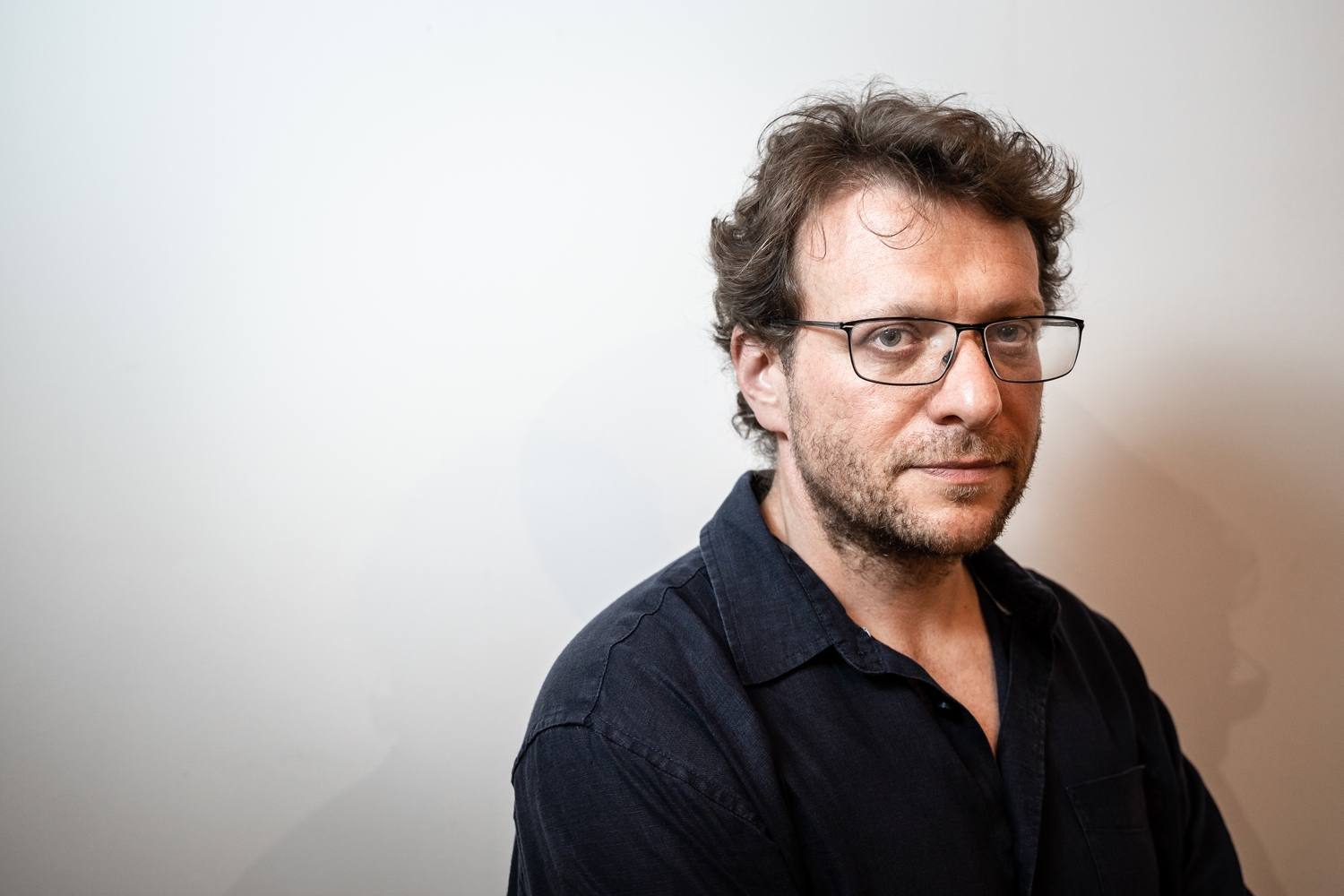
Peter Pomerantsev photographed by Artem Galkin for Ukraïner.
Our objective is to build cases globally by identifying patterns and pursuing prosecutions. This initiative is a strategic response to disinformation and impunity, challenging the foundation on which authoritarian propaganda thrives. It counters the narrative that facts and truth don’t matter, and justice is non-existent. Bridging the gap between truth and justice is crucial in combating the Putins of the world. We scrutinise the legal accountability of Russian propagandists, exploring avenues for their trial and increased sanctions, though this poses challenges due to historical protection under freedom of speech. While efforts are underway to examine Russian propaganda’s potential incitement to genocide, the focus remains on connecting propaganda to specific war crimes and crimes against humanity, such as the attacks on the maternity hospital in Mariupol or the bombing of Kramatorsk. Understanding the propagandists’ objectives in these operations, which constitute war crimes, is key to breaking new ground in holding them accountable.
— How are the propagandists connected to Russia’s war crimes?
— You would look at a thousand Telegram accounts and twenty YouTube channels in the preface to the attack, saying the same things more and more frequently, which is quite easily traceable through digital technology. Something you couldn’t in the Second World War. So if you could show that, in the days before the attack, there were mentions of battalions at Mariupol hospital going up XXX percent, this is already showing some sort of coordinated behaviour. Who’s responsible for that behaviour? What’s the connection between the troll farms and the [Russian] Presidential Administration? Are there any emails that have come to light which show that? So you’d have to show what’s happening in the propaganda, how it relates to what’s happening on the ground, and then you’d have to establish how the system works.
And I do think that we already saw Russia using propaganda in a very integrated way with its various war crimes in Syria. Some people looked into this in Syria and saw those patterns. And there is plenty of research regarding what they’re doing today.
— What are your views on collective responsibility in the context of the German case and present-day Russia? Many Ukrainians are dissatisfied with the West attributing actions solely to leaders like Putin, ignoring collective responsibility.
— The question of collective responsibility is not solely tied to recent events. Russia’s historical and cultural context reveals a centuries-long aggression towards Ukraine, deeply embedded in Russian literature and education. The notion that this is a result of Putin’s actions alone is considered absurd, as it aligns with Russia’s historical patterns and its recurring attempts at what seems to be genocide. And just historically, this is part of Russian culture and history, and this is just what they do. This is not the first time they’re trying a genocide here.
Regarding the question of responsibility, let’s consider the German example 70 years after the war. Debates persist about whether Germans were responsible for the Holocaust, showcasing a profound philosophical question that often blurs the line between responsibility and guilt. The distinction between responsibility and guilt becomes crucial in understanding the impact of propaganda. Some Russians who acknowledge a sense of responsibility tend to resist Putin’s propaganda. Putin’s narrative revolves around negating individual responsibility, fostering a belief that democratic agency is non-existent, and using slogans like “нас заставили” (from Russian: we were forced) to undermine individual agency.
Putin’s propaganda constructs a worldview where individuals are stripped of responsibility and freedom, needing an authoritarian leader to navigate a world dominated by vast conspiracies and confusion. Succumbing to this narrative means relinquishing responsibility and agency, aligning with Putin’s propaganda model. Even individuals strongly opposed to Putin may inadvertently perpetuate these ideas if they disavow responsibility. Ukrainians can observe and judge this dynamic.
Sociological research in Russia reveals the persistence of psychological myths, even among those critical of the war. Participants may express disapproval of the conflict but still echo myths propagated by Putin’s regime, such as the notion of defending against an external threat. This phenomenon extends to young people who fled Russia, fearing mobilisation yet unwittingly repeating ingrained propaganda.
Jacques Ellul’s insights into the depth of powerful propaganda and its integration into mythical structures become evident in understanding why certain ideas resonate so deeply. The challenge lies in addressing these entrenched attitudes, even among those who consciously disagree with the war. The importance of responsibility in dismantling the Russian psychological system becomes apparent.
Individuals who proclaim “I take responsibility” but struggle to unite outside of Russia illustrate the pervasive influence of propaganda. Even beyond Russia, a belief in a lack of agency and an inability to effect change mirrors one of Putin’s key propaganda messages. Tackling these attitudes is essential for undermining the grip of the Russian psychological system.

